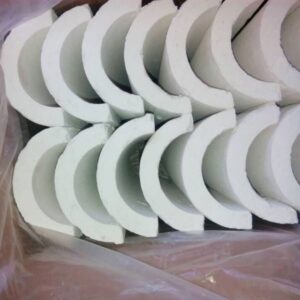Thicker and denser calcium silicate pipes have several advantages over thinner and less dense pipes, including:
Improved insulation properties: Thicker and denser calcium silicate pipes provide better insulation properties, helping to reduce heat loss and improve energy efficiency. This can result in lower energy costs and a more comfortable working environment.
Increased durability: Thicker and denser calcium silicate pipes are more durable and can withstand harsher environmental conditions, such as high temperatures and exposure to moisture. This can result in longer service life and lower maintenance costs.
Better fire resistance: Thicker and denser calcium silicate pipes provide better fire resistance, which can help to prevent the spread of fire and protect surrounding equipment and structures.
Improved sound insulation: Thicker and denser calcium silicate pipes can also provide improved sound insulation properties, helping to reduce noise levels in industrial and commercial environments.
Enhanced safety: Thicker and denser calcium silicate pipes can help to enhance safety in industrial and commercial settings by providing better fire resistance and reducing the risk of heat-related accidents.
However, thicker and denser calcium silicate pipes may be more expensive than thinner and less dense pipes, and may also be heavier and more difficult to install. When selecting calcium silicate pipes, it’s important to consider the specific requirements of your application and balance the benefits of thicker and denser pipes against any potential drawbacks.
How can I determine the specific requirements of my application?
To determine the specific requirements of your application for calcium silicate pipes, consider the following factors:
Temperature range: Determine the maximum and minimum temperatures that your pipes will be exposed to. This will help you select a calcium silicate pipe with the appropriate temperature rating.
Pipe size and shape: Measure the size and shape of your pipes to determine the amount of insulation material required. calcium silicate pipe This will help you select the appropriate thickness and density of calcium silicate pipe.
Environmental conditions: Consider the environmental conditions in which your pipes will be installed, including exposure to moisture, chemicals, and other factors that may affect the durability and performance of the insulation material.
Industry standards and regulations: Determine any relevant industry standards and regulations for insulation materials in your industry and region. This will help ensure that the calcium silicate pipe you select meets the necessary requirements.
Budget: Consider your budget for insulation materials and weigh the costs and benefits of different options.
Installation: Consider the ease of installation of different types of calcium silicate pipes and whether you have the necessary equipment and expertise to install them.
By considering these factors, you can determine the specific requirements of your application for calcium silicate pipes and select the appropriate thickness, density, and other properties to meet your needs. It’s also important to consult with insulation experts and manufacturers to ensure that you are selecting the right insulation material for your specific application.
